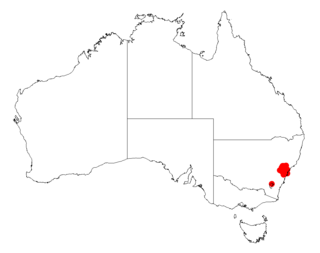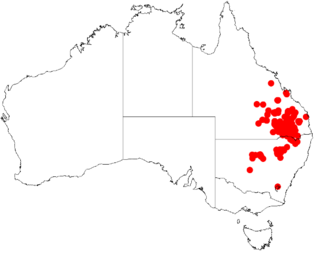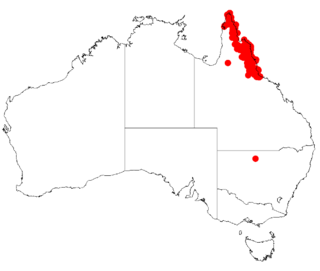
Acacia repanda is a shrub belonging to the genus Acacia and the subgenus Juliflorae that is endemic to a small area in western Australia.

Acacia richardsii is a shrub belonging to the genus Acacia and the subgenus Juliflorae that is endemic to north western Australia.

Acacia wickhamii is a shrub belonging to the genus Acacia and the subgenus Juliflorae that is endemic to parts of northern Australia.

Acacia andrewsii is a shrub belonging to the genus Acacia and the subgenus Phyllodineae that is endemic to western Australia.

Acacia ingrata is a shrub belonging to the genus Acacia and the subgenus Phyllodineae that is endemic to south western Australia.

Acacia obovata is a shrub belonging to the genus Acacia and the subgenus Phyllodineae that is endemic to south western Australia.

Acacia subtilinervis, also known as the net-veined wattle, is a rare wattle in the Juliflorae subgenus found in eastern Australia.

Acacia cretacea, also known as chalky wattle, is a shrub belonging to the genus Acacia and the subgenus Phyllodineae that is endemic to South Australia.

Acacia dictyocarpa is a shrub belonging to the genus Acacia and the subgenus Phyllodineae that is endemic to south eastern Australia.

Acacia saliciformis is a shrub or tree belonging to the genus Acacia and the subgenus Phyllodineae native to eastern Australia.

Acacia kybeanensis, commonly known as kybean wattle or kybeyan wattle, is a shrub of the genus Acacia and the subgenus Phyllodineae that is endemic to south eastern Australia.

Acacia kydrensis, commonly known as Kydra wattle, is a shrub of the genus Acacia and the subgenus Phyllodineae that is endemic to south eastern Australia.

Acacia linearifolia, commonly known as stringybark wattle or narrow-leaved wattle, is a shrub or tree of the genus Acacia and the subgenus Phyllodineae that is endemic to eastern Australia.

Acacia burrowii, commonly known as Burrow's wattle, is a tree belonging to the genus Acacia and the subgenus Juliflorae that is native to eastern Australia.

Acacia calyculata is a shrub belonging to the genus Acacia and the subgenus Juliflorae that is native to north eastern Australia.

Acacia cretata is a shrub or tree belonging to the genus Acacia and the subgenus Juliflorae that is native to north eastern Australia.

Acacia curranii, also known as curly-bark wattle, is a shrub belonging to the genus Acacia and the subgenus Juliflorae that is native to north eastern Australia. It is listed as vulnerable under the Environment Protection and Biodiversity Conservation Act 1999.

Acacia striatifolia is a shrub or tree belonging to the genus Acacia and the subgenus Juliflorae that is native to north eastern Australia.

Acacia pycnostachya, also known as Bolivia wattle, is a shrub or tree belonging to the genus Acacia and the subgenus Juliflorae that is native to eastern Australia.

Acacia rhodoxylon, also known as rosewood, ringy rosewood or spear wattle, is a tree belonging to the genus Acacia and the subgenus Juliflorae that is native to north eastern Australia.





















